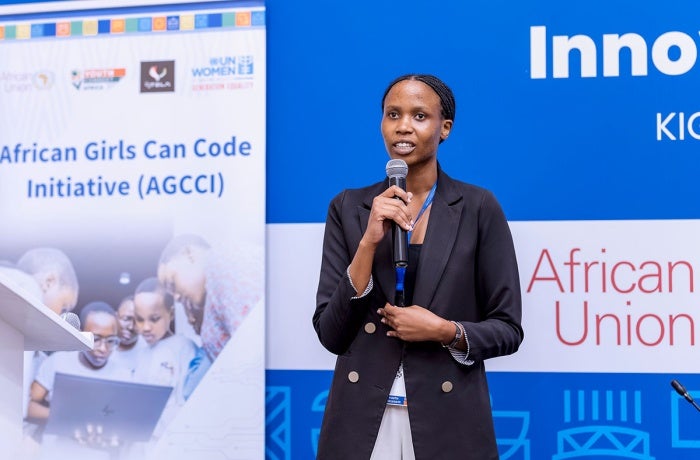“I want to build a network of powerful Roma women and girls” – Anzhelika Bielova on Roma women’s activism and leadership in Ukraine
For International Roma Day, learn and share what Roma women activists are doing to support their communities in Ukraine.
“I know how difficult it is to be a Roma woman, because we face discrimination outside the community, but also inside the community,” said Anzhelika Bielova, who spoke at the Youth Interactive Dialogue during the 68th session of the Commission on the Status of Women (CSW68) at the UN Headquarters in New York. Bielova is determined to bring out the voices of Roma women in Ukraine and on the international stage.

According to the 2001 census in Ukraine, nearly 48,000 people identified themselves as Roma, however, unofficial sources claim that the actual number could be between 200,000 – 400,000. Bielova is from Zaporizhzhia, southern Ukraine, and works in the country's southeastern and western regions.
In 2020, she started the Voice of Romni, an association led by Roma women in Ukraine, to support women’s economic empowerment and leadership. With the war in Ukraine in its second year, the organization is working to improve access to humanitarian aid, cash assistance, and economic recovery of Roma and internally displaced Roma women in Ukraine, with programmatic and institutional financing provided by the United Nations Women’s Peace and Humanitarian Fund (WPHF).
Impact of the war in Ukraine on Roma women
“In the western part of Ukraine, there are a lot of women in the [Roma] community, who are living in compact settlements, without [heating/cooking] gas or access to clean water,” she said. “The poverty is really so intense in this community.”
However, the Roma community is not a homogenous group, cautions Bielova, the needs and experiences differ among different ethnic groups in different regions. This is why the role of grassroots, women-led organizations, such as hers, is critical in making sure that humanitarian aid reaches Roma women, who are often the most marginalized, may not have identification documents to access services, and may lack information on how and where to access support.
“Because of the war, a lot of people have again lost their jobs. A lot of people are internally displaced, and they can't find a job for their specialty [or skills],” explained Bielova. Her organization offers women’s centres – safe spaces for women to learn new skills, connect with other women, and access support if they are experiencing gender-based violence.
“In our centres, we have a room for children with a babysitter so that women take a course or attend computer classes.” Since the COVID-19 pandemic and Russia’s full-scale invasion of Ukraine, a lot of Roma families, especially women and children, do not have access to laptops and smart phones, she added.
Starting difficult conversations about gender-based violence
“One of my priorities is combatting gender-based violence. It’s a taboo topic in the Roma community... because it is a patriarchal culture, like many others,” said Bielova.
Within the Roma community, the most discriminated are the Roma women, and Bielova points to their lack of education as a major roadblock to gaining access to information, decent work and income, or better living conditions.
“I personally faced an attempted femicide in 2019,” shared Bielova. “I was attacked by a man with a knife at the entrance of my home.”
Bielova survived the attack and went on to start Voices of Romni: “I knew that I had to make this world safer for girls and women, for my own daughter. At the time, she was only four months old.”
“My goal is to start this difficult conversation [about gender-based violence] within the Roma community and develop long-term solutions.”
Investing in Roma women’s leadership
For Bielova, investing in women – a theme threading across International Women’s Day and the international agreement reached at CSW68 to alleviate women’s poverty – is about investing in Roma women’s leadership.
“I want to build a network of powerful Roma women and girls.” Says Bielova.
Making sure that Roma women have equal access to rights and opportunities needs investment. “Finance the implementation of the Roma strategy in Ukraine,” is one of Bielova’s main message to the international community.
The strategy aims to support integration and participation of Roma people in public life in Ukraine and improve their access to education, employment, services, and identity documentation. Activists like Bielova are at the forefront to bring Roma women’s voices, agency, and perspectives into such efforts. UN Women, in partnership with the Council of Europe has supported an evaluation of the 2020 strategy to inform the development of the post-2020 Roma strategy and the national action plan on its implementation.
Bielova dreams of a future where Roma women lead organizations, businesses, and activism: “I just want to see a happy Roma community, and strong women who know their rights and can achieve anything that they want to in their lives.”









